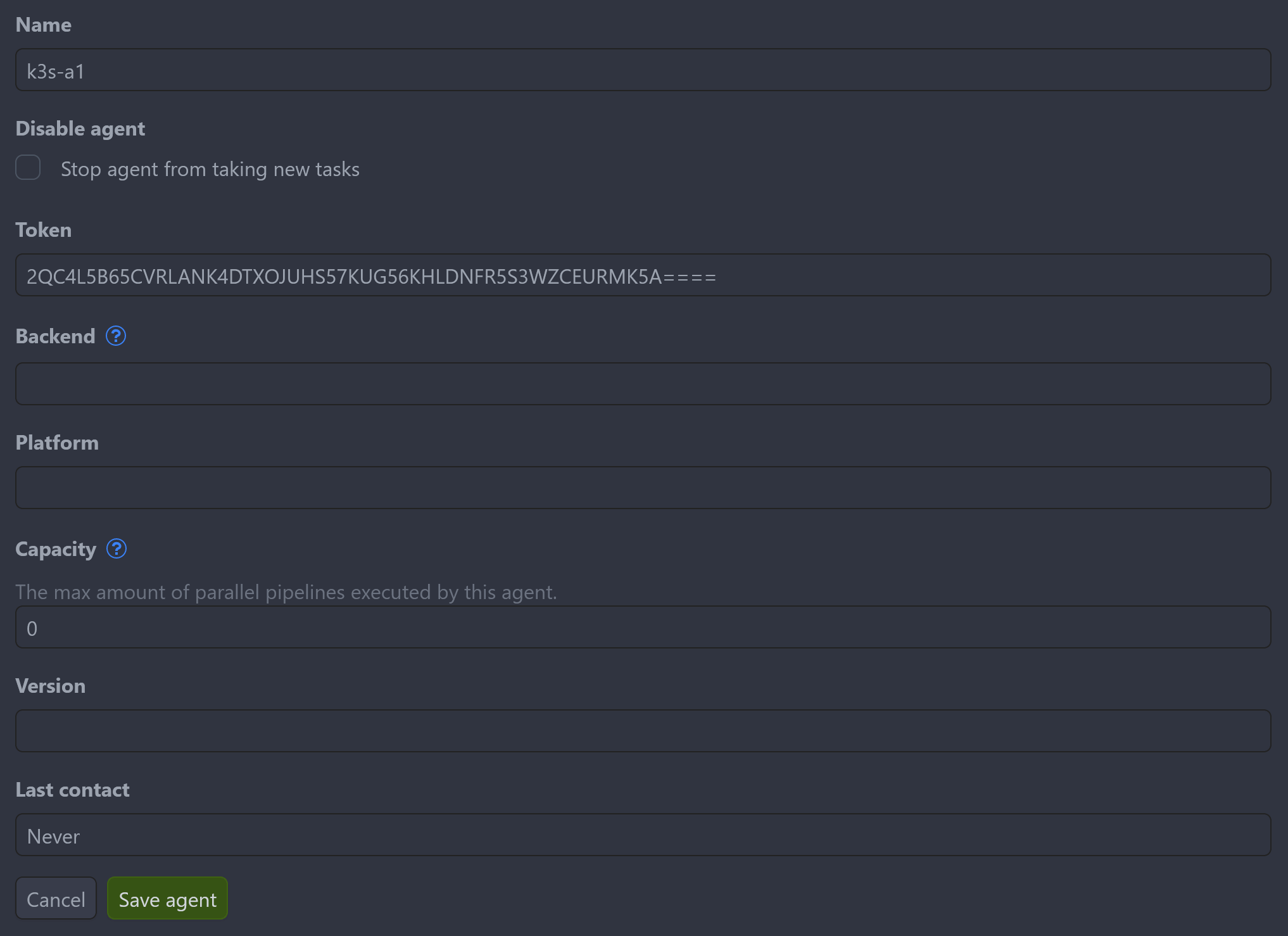Agent
Agents are configured by the command line or environment variables. At the minimum you need the following information:
WOODPECKER_SERVER=localhost:9000
WOODPECKER_AGENT_SECRET="your-shared-secret-goes-here"
The following are automatically set and can be overridden:
WOODPECKER_HOSTNAMEif not set, becomes the OS' hostnameWOODPECKER_MAX_WORKFLOWSif not set, defaults to 1
Workflows per agent
By default, the maximum workflows that are executed in parallel on an agent is 1. If required, you can add WOODPECKER_MAX_WORKFLOWS to increase your parallel processing for an agent.
WOODPECKER_SERVER=localhost:9000
WOODPECKER_AGENT_SECRET="your-shared-secret-goes-here"
WOODPECKER_MAX_WORKFLOWS=4
Agent registration
When the agent starts it connects to the server using the token from WOODPECKER_AGENT_SECRET. The server identifies the agent and registers the agent in its database if it wasn't connected before.
There are two types of tokens to connect an agent to the server:
Using system token
A system token is a token that is used system-wide, e.g. when you set the same token in WOODPECKER_AGENT_SECRET on both the server and the agents.
In that case registration process would be as following:
- The first time the agent communicates with the server, it is using the system token
- The server registers the agent in its database if not done before and generates a unique ID which is then sent back to the agent
- The agent stores the received ID in a file (configured by
WOODPECKER_AGENT_CONFIG_FILE) - At the following startups, the agent uses the system token and its received ID to identify itself to the server
Using agent token
An agent token is a token that is used by only one particular agent. This unique token is applied to the agent by WOODPECKER_AGENT_SECRET.
To get an agent token you have to register the agent manually in the server using the UI:
- The administrator registers a new agent manually at
Settings -> Agents -> Add agent
- The generated token from the previous step has to be provided to the agent using
WOODPECKER_AGENT_SECRET - The agent will connect to the server using the provided token and will update its status in the UI:
Environment variables
SERVER
- Name:
WOODPECKER_SERVER - Default:
localhost:9000
Configures gRPC address of the server.
USERNAME
- Name:
WOODPECKER_USERNAME - Default:
x-oauth-basic
The gRPC username.
AGENT_SECRET
- Name:
WOODPECKER_AGENT_SECRET - Default: none
A shared secret used by server and agents to authenticate communication. A secret can be generated by openssl rand -hex 32.
AGENT_SECRET_FILE
- Name:
WOODPECKER_AGENT_SECRET_FILE - Default: none
Read the value for WOODPECKER_AGENT_SECRET from the specified filepath, e.g. /etc/woodpecker/agent-secret.conf
LOG_LEVEL
- Name:
WOODPECKER_LOG_LEVEL - Default:
info
Configures the logging level. Possible values are trace, debug, info, warn, error, fatal, panic, disabled and empty.
DEBUG_PRETTY
- Name:
WOODPECKER_DEBUG_PRETTY - Default:
false
Enable pretty-printed debug output.
DEBUG_NOCOLOR
- Name:
WOODPECKER_DEBUG_NOCOLOR - Default:
true
Disable colored debug output.
HOSTNAME
- Name:
WOODPECKER_HOSTNAME - Default: none
Configures the agent hostname.
AGENT_CONFIG_FILE
- Name:
WOODPECKER_AGENT_CONFIG_FILE - Default:
/etc/woodpecker/agent.conf
Configures the path of the agent config file.
MAX_WORKFLOWS
- Name:
WOODPECKER_MAX_WORKFLOWS - Default:
1
Configures the number of parallel workflows.
AGENT_LABELS
- Name:
WOODPECKER_AGENT_LABELS - Default: none
Configures custom labels for the agent, to let workflows filter by it.
Use a list of key-value pairs like key=value,second-key=*. * can be used as a wildcard.
If you use ! as key prefix it is mandatory for the workflow to have that label set (without !) set and matched.
By default, agents provide four additional labels platform=os/arch, hostname=my-agent, backend=my-backend and repo=* which can be overwritten if needed.
To learn how labels work, check out the pipeline syntax page.
HEALTHCHECK
- Name:
WOODPECKER_HEALTHCHECK - Default:
true
Enable healthcheck endpoint.
HEALTHCHECK_ADDR
- Name:
WOODPECKER_HEALTHCHECK_ADDR - Default:
:3000
Configures healthcheck endpoint address.
KEEPALIVE_TIME
- Name:
WOODPECKER_KEEPALIVE_TIME - Default: none
After a duration of this time of no activity, the agent pings the server to check if the transport is still alive.
KEEPALIVE_TIMEOUT
- Name:
WOODPECKER_KEEPALIVE_TIMEOUT - Default:
20s
After pinging for a keepalive check, the agent waits for a duration of this time before closing the connection if no activity.
GRPC_SECURE
- Name:
WOODPECKER_GRPC_SECURE - Default:
false
Configures if the connection to WOODPECKER_SERVER should be made using a secure transport.
GRPC_VERIFY
- Name:
WOODPECKER_GRPC_VERIFY - Default:
true
Configures if the gRPC server certificate should be verified, only valid when WOODPECKER_GRPC_SECURE is true.
BACKEND
- Name:
WOODPECKER_BACKEND - Default:
auto-detect
Configures the backend engine to run pipelines on. Possible values are auto-detect, docker, local or kubernetes.
BACKEND_DOCKER_*
See Docker backend configuration
BACKEND_K8S_*
See Kubernetes backend configuration
BACKEND_LOCAL_*
See Local backend configuration
Advanced Settings
Only change these If you know what you do.
CONNECT_RETRY_COUNT
- Name:
WOODPECKER_CONNECT_RETRY_COUNT - Default:
5
Configures number of times agent retries to connect to the server.
CONNECT_RETRY_DELAY
- Name:
WOODPECKER_CONNECT_RETRY_DELAY - Default:
2s
Configures delay between agent connection retries to the server.